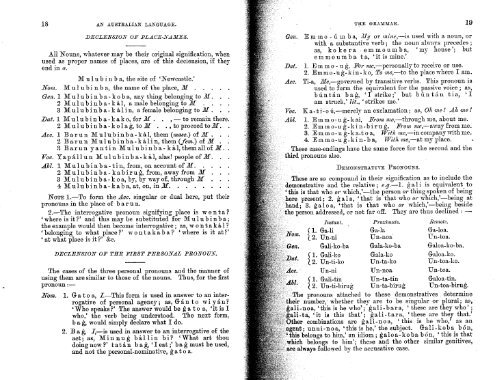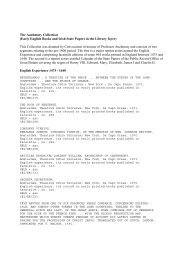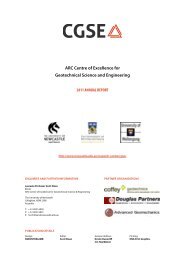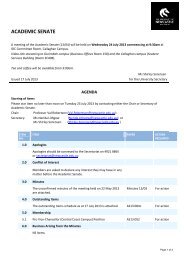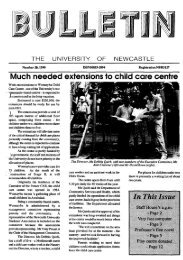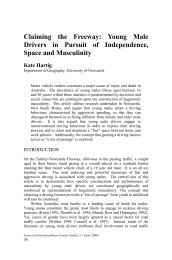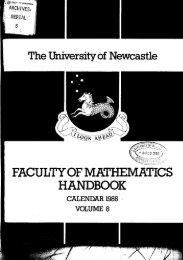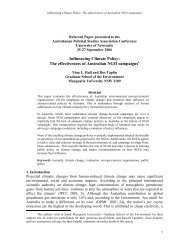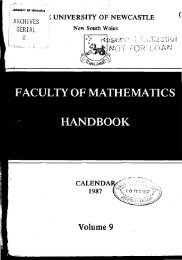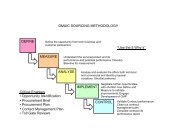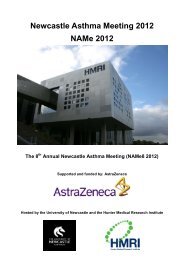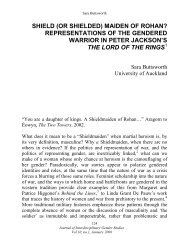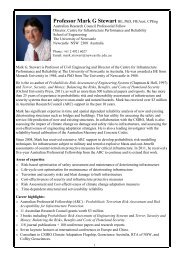n - University of Newcastle
n - University of Newcastle
n - University of Newcastle
You also want an ePaper? Increase the reach of your titles
YUMPU automatically turns print PDFs into web optimized ePapers that Google loves.
18 ~ii AUSTBSLIAX LAXQITAGE.<br />
All Nouns, n-hatever nlay be their original signification, m-hen<br />
used as proper names <strong>of</strong> places, are <strong>of</strong> this declension, if they<br />
end ia a.<br />
M u 1 u b in b a, the site <strong>of</strong> 'Ke-ircastle.'<br />
Nont. &I u 1 u b i n b a, the name <strong>of</strong> the place, dI . . . . .<br />
Gen.1 Mulubinba-koba, a~ythingbe1ongingtoJ.f. . .<br />
2 Mulnbinba-kal, amalebelongiugtoX . . . .<br />
3 Mulubinba-kalin, a female belonging to M . . .<br />
Bat. 1 Mulubinba-liako, for M . . ,-to remain there.<br />
2 Mulubinba-kolag, toiU . . , toproceedtoill. .<br />
Acc. 1 Barun Mulubinba-kal,them(azasc.)<strong>of</strong>X. . .<br />
2 Barnn Mulubinba-lialin, them (fen*.) <strong>of</strong> H . .<br />
3 Barun yantin Mulubinba-ki1,themall<strong>of</strong> X. .<br />
Boc. PapBllun Mulubinba-kil, alas! people <strong>of</strong> M. . .<br />
Abl. 1 Mulubinba-tin,from,onaccount<strong>of</strong>X. . . . .<br />
2 Mulubinba-kabirug, from, away from Jf . . .<br />
3 Nulubinba-koa, by, by vay<strong>of</strong>, through M . . .<br />
4 Mulubinba-kaba,at, on, inN. . . . . . . .<br />
NOTE 1.-TO form the Acc. singular or dual here, put their<br />
pronouns in the place <strong>of</strong> b a r u n.<br />
2.-The interrogative pronoun signifying place is w o n t a ?<br />
' where is it ?' and this may be substituted for M u 1 u b in b a ;<br />
the example would then become interrogative ; as, M- o n t a k a I ?<br />
' belonging to what place ?' IV o n t a k a b a ? ' where is it at 'i'<br />
' at what place is it ?' kc.<br />
DECLENSION OF THE FIRST PERSO-VaL PROA70UA-.<br />
The cases <strong>of</strong> the three l~ersonal pronouns and the manner <strong>of</strong><br />
using them are similar to those <strong>of</strong> the nouns. Thus, for the first<br />
pronoun :-<br />
NO~. 1. G a to a, L-This form is used in acswer to an interrogative<br />
<strong>of</strong> personal agency ; as, G B n t o mi y & n ?<br />
'Who speaks?' The answer mould be g a to a, 'it is I<br />
who,' the verb being understood. The next form,<br />
b a g, would simply declare what I do.<br />
2. B a g, 4-is used in answer to an interrogative <strong>of</strong> the<br />
act; as, Minnug ballin bi? 'What art thou<br />
doingnow?' tat&n bag,'Ieat;'bagmustbeused,<br />
and not the personal-nominatire, gat o a.<br />
TgE GRAXXhI1. 19<br />
Geiz. E m m o - 6 m b a, ~1Iy or qizi?ze,-ia usecl m-it11 a noun, or<br />
with a substantive rerb ; the noun aln-ays precedes ;<br />
as, kokera .enznloumba, 'my house';<br />
emmoumba ta, 'it is mine.'<br />
but<br />
Bat. 1. Em m o - u g, 301- wte,--personally to receive or use.<br />
2. Emm o -u g- lc in - lio, To ,i>he,-to the place 11-here I am.<br />
Acc. Ti-a, Xe,-governed by transitive verbs. This proiloun is<br />
used to form the equivalent for the passi~-e voice ; as,<br />
b6nt6n bag, 'I strike;' but bi~atiin tia, 'I<br />
nm strucii,' Zif., ' strikes me.'<br />
TGc. K a - t i- o 6,-mere1~- an exclamation ; as, Oh me ! A7& me !<br />
DE~~OXSTXATITE PEOXOGSS.<br />
(1 in their signification as to include the<br />
elative ; e.g.-1. gali is equivalent to<br />
11,'-the person or thing spoken <strong>of</strong> being<br />
'that is that who 07- which,'-being at<br />
is that who or which,'-being beside<br />
ot far <strong>of</strong>£. They are thus declined : -<br />
Proril~~afe. l~enz<strong>of</strong>e.<br />
Ga-loa.<br />
-LTn-toa.<br />
Gala-ko-ba Gdoa-ko-ba.<br />
Galoa-ko.<br />
Un-toa-lco.<br />
Un-toa.<br />
un-ta-tin Galoa-tin.<br />
En-toa-birug.


